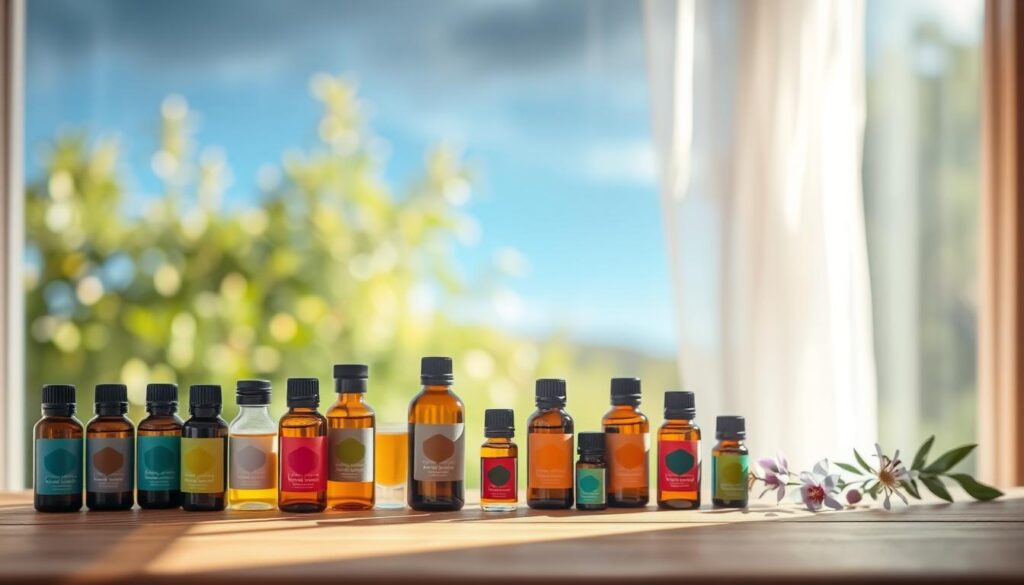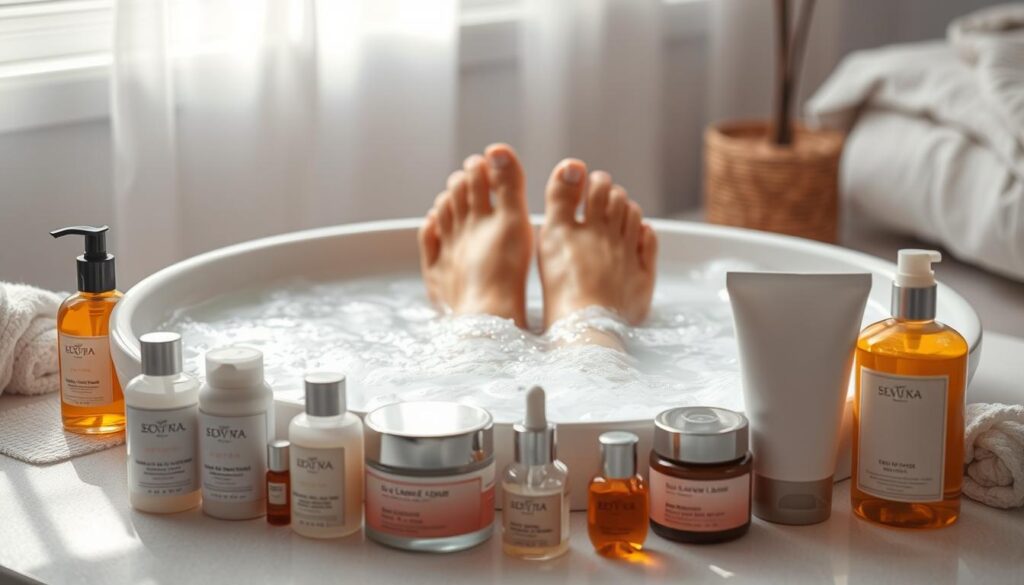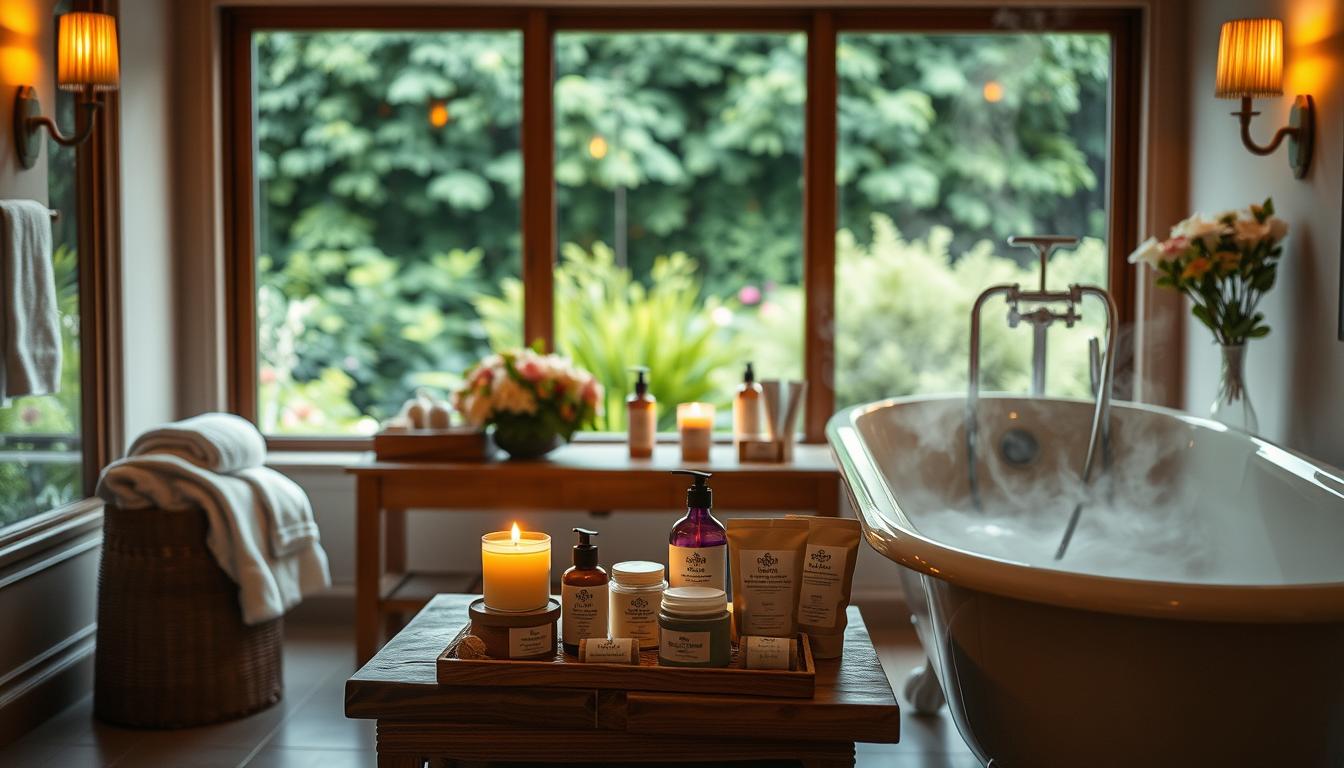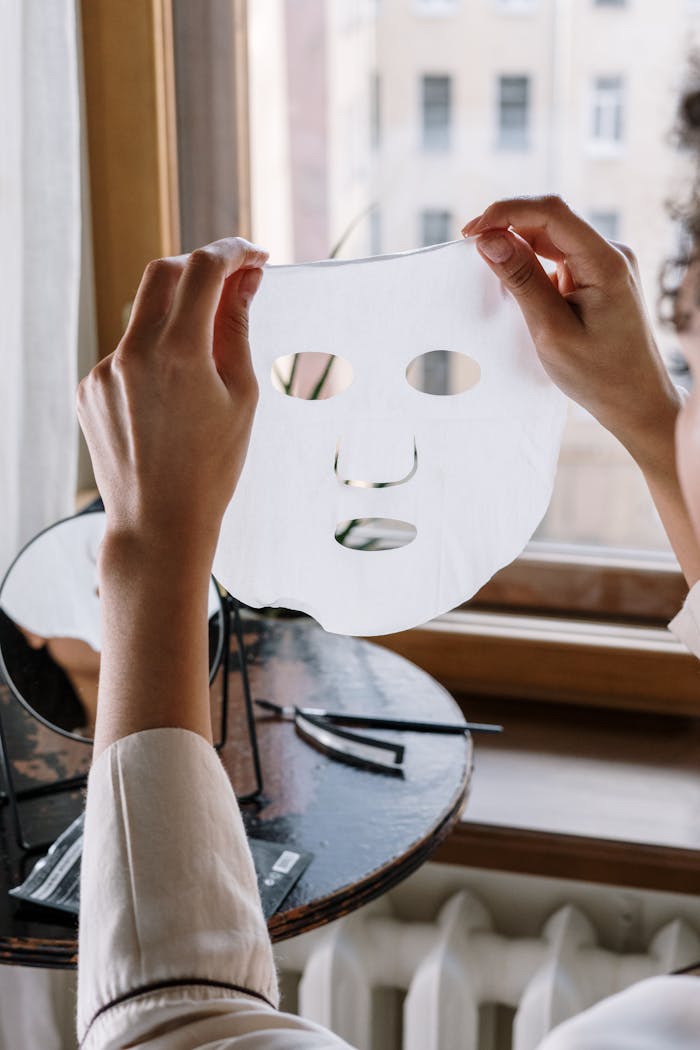In today’s fast world, self-care is more important than ever. Work and personal life demands can make us forget about ourselves. But, relaxation and self-care are key to staying healthy.
Research shows that beauty and spa treatments can lower stress and boost mental health. Here, we’ll share our best tips for a calming self-care routine that’s easy to follow.
Key Takeaways
- Learn how to prioritize self-care in your busy schedule.
- Discover simple beauty and spa treatments for relaxation.
- Understand the benefits of a consistent self-care routine.
- Find out how to create a peaceful environment for self-care.
- Get tips on making self-care a sustainable habit.
Understanding the Importance of Self-Care
Modern life is full of stress and pressure. But, knowing the value of self-care can change everything. It’s not just good for us; it’s crucial. By making self-care a part of our daily lives, we can greatly improve our overall well-being.
Why Self-Care Matters
Self-care lets us recharge and refocus. It helps us deal with life’s ups and downs better. Regular self-care practices can lower stress, boost our mood, and give us more energy. This can make us perform better in work and life.
Self-care is personal and varies for everyone. It could be reading, meditation, or a relaxing bath. These activities help us relax and feel better. For more on self-care and well-being, check out Revitalize Clinic Spa.
Benefits for Mental and Physical Health
Self-care is great for our mental health. It can lessen anxiety and depression, making us happier. It helps us find better ways to handle stress and stay strong.
For our bodies, self-care means better sleep, eating well, and moving more. These habits make our immune system stronger and lower the risk of serious diseases. By focusing on self-care, we’re investing in our health and happiness for the long run.
Creating a Home Spa Experience
Creating a home spa is easy with a few steps. You need to set the right mood, use the right products, and add elements that help you relax.
Setting the Right Atmosphere
The mood of your home spa is key for relaxation. Start by dimming the lights and lighting scented candles. This creates a calm setting. The soft light and fragrance help you relax.
Using essential oils in a diffuser can also improve the mood. Lavender and chamomile are great for their calming effects.
Essential Spa Products to Have
You’ll need the right products for a good home spa. Start with a quality moisturizer and a gentle cleanser. Exfoliating gloves and a loofah remove dead skin, making your skin smooth.
For a luxury experience, look into spa services or products that deeply nourish your skin.
Incorporating Relaxing Sounds
Sound is important for a relaxing atmosphere. Play calming music or nature sounds in the background. You can find many playlists online made for relaxation and meditation.
The goal is to make a peaceful space. This lets you fully enjoy your home spa experience.
Skincare Essentials for Your Routine
To keep your skin looking great, knowing the basics of skincare is important. A good skincare routine has several key steps. These steps work together to make your skin healthier.
Cleansing: The First Step to Radiance
Cleansing is the first step in any skincare routine. It gets rid of dirt, oil, and makeup. This helps prevent clogged pores and breakouts. Choosing the right cleanser for your skin is key.
If you have dry skin, use a gentle, hydrating cleanser. For oily skin, a foaming cleanser can help control oil. Look for cleansers with salicylic acid for exfoliation and acne control, and glycerin for hydration. Always cleanse your skin twice a day, morning and night, to keep it balanced.
Hydration: Choosing the Right Moisturizers
Hydration is the next step after cleansing. Moisturizers help lock in moisture, supporting the skin’s barrier. The right moisturizer depends on your skin type.
For dry or mature skin, use rich, emollient moisturizers. For oily skin, choose lightweight, oil-free moisturizers. Look for moisturizers with hyaluronic acid for intense hydration. Consider products with ceramides to support the skin’s barrier. Apply moisturizer while your skin is still damp to enhance absorption.
- Look for moisturizers with hyaluronic acid for intense hydration.
- Consider products with ceramides to support the skin’s barrier.
- Apply moisturizer while your skin is still damp to enhance absorption.
Exfoliation: Keeping Your Skin Fresh
Exfoliation removes dead skin cells from your skin’s surface. Regular exfoliation improves skin texture, reduces pores, and aids in skin renewal. There are physical (scrubs or brushes) and chemical (alpha-hydroxy acids or beta-hydroxy acids) types of exfoliation.
Most skin types need exfoliation 1-3 times a week. Sensitive skin may need less. Always follow the product instructions and start slowly to gauge your skin’s response.
By adding these essential steps to your skincare routine, you can get healthier, more radiant skin. Remember, being consistent is key, and it may take time to see the full benefits.
The Power of Aromatherapy
Aromatherapy is a powerful tool for relaxation and stress relief. It uses essential oils from plants to improve physical and emotional health. These oils can affect mood, thinking, and overall health by stimulating the brain’s limbic system.

Popular Essential Oils for Relaxation
Some essential oils are known for their calming effects. Lavender oil is famous for helping people relax and sleep better. Spas often use lavender for its calming effects Eucalyptus oil is great for easing congestion and stress.
“Aromatherapy is a holistic healing treatment that uses essential oils to promote physical, emotional, and mental well-being.”
How to Use Aromatherapy at Home
Adding aromatherapy to your daily life is easy and rewarding. Here are a few ways to start:
- Diffusion: An essential oil diffuser spreads the fragrance and benefits of oils in your home.
- Topical Application: Mixing oils with a carrier oil for massage or applying to pulse points works well.
- Bath Salts: Adding oils to bath water can make it more relaxing.
| Essential Oil | Benefits | Usage |
|---|---|---|
| Lavender | Promotes relaxation, improves sleep | Diffusion, topical application |
| Eucalyptus | Decongestant, reduces stress | Diffusion, inhalation |
| Chamomile | Soothes anxiety, promotes calmness | Diffusion, bath salts |
Learning about different essential oils and their uses can help you customize your aromatherapy. This can make your relaxation and wellness routine even better.
Relaxation Techniques We Love
Finding peace is key, and we’re here to help. In today’s world, stress can be overwhelming. It’s important to have ways to calm your mind and body.
Relaxation techniques do more than just relax you. They help you feel better overall. By adding these to your daily life, you can handle stress better and think clearer.
Deep Breathing Exercises
Deep breathing is a simple yet powerful way to relax. It calms your nervous system and lowers stress. To do it, sit comfortably, close your eyes, and breathe in deeply through your nose.
Hold your breath for a few seconds, then breathe out slowly through your mouth. Do this a few times, focusing on your breath.
Tips for Effective Deep Breathing:
- Practice regularly to make it a habit.
- Use a guided recording if you’re new to deep breathing.
- Combine deep breathing with other relaxation techniques for enhanced benefits.
Guided Meditation and Mindfulness
Guided meditation and mindfulness are great for relaxation too. They help you focus on the present moment. Guided meditations can be found on apps and online, helping you stay on track.
Mindfulness means being in the now, without judgment. It helps reduce stress and brings calm. Start with short sessions, like a few minutes a day, and grow as you get more comfortable.
Adding these techniques to your life can make it more balanced and peaceful. Whether it’s deep breathing, meditation, or mindfulness, find what works for you. Make it a regular part of your self-care.
Beauty Treatments for Glowing Skin
Looking for radiant skin? We need to try different beauty treatments. These range from easy home remedies to fancy spa treatments.
DIY Masks to Try
DIY masks are a great way to pamper yourself without spending much. You can make them with common kitchen items like honey, avocado, and oatmeal. For example, a honey and oatmeal mask can moisturize and soothe your skin.
- Honey and oatmeal mask for hydration
- Avocado mask for nourishment
- Coffee grounds mask for exfoliation
Benefits of Facial Treatments
Facial treatments do a lot for your skin. They clean deep, improve texture, and reduce wrinkles. You can get them tailored to fix specific skin issues like acne or dryness.
Facial treatments offer many benefits, including:
- Deep cleansing of pores
- Improved skin texture and tone
- Reduced appearance of fine lines and wrinkles
The Role of Regular Facials
Regular facials are key to keeping your skin healthy and glowing. They help keep your skin elastic and even-toned. Plus, they let professionals check your skin and suggest the best treatments.
Here are some tips to get the most from facials:
- Schedule regular facials based on your skin type and concerns
- Follow a consistent skincare routine at home
- Use products recommended by your esthetician
Hair Care Strategies for Healthy Locks
Getting healthy, beautiful hair is more than just washing it regularly. It needs a complete hair care strategy. With so many products and methods out there, it’s easy to feel lost. But, by focusing on a few important steps, you can make your hair healthier and look better.
Creating a Nourishing Hair Mask
A nourishing hair mask is key for any hair care plan. It gives your hair a deep dose of moisture and nutrients. This helps fix damage and makes your hair soft and shiny. To make your own mask, try mixing coconut oil, avocado, and honey. For instance, avocado, olive oil, and honey make a great mask.
As
“The key to healthy hair is not just about using the right products, but also about understanding your hair’s specific needs.”
This understanding helps you pick the best ingredients for your mask.
Tips for Maintaining Your Hair’s Health
Keeping your hair healthy is more than just using a hair mask. Here are some tips to remember:
- Use a wide-tooth comb to avoid breakage, mainly when your hair is wet.
- Stay away from hot water, which can take away your hair’s natural oils. Use warm water instead.
- Try to use heat styling tools less, or use a heat protectant spray to prevent damage.
- Get regular trims to stop split ends from moving up the hair shaft.
By adding these habits to your hair care routine, you’ll be on the path to healthier, stronger hair. Remember, consistency is key in hair care. With patience and the right approach, you can have the beautiful, healthy hair you’ve always wanted.
Pampering Your Feet and Hands
Taking care of our feet and hands is key to self-care. It boosts our well-being and helps us relax.
The Importance of Foot Soaks
Foot soaks are a great way to pamper ourselves. They soften calluses, cut down foot odor, and ease stress. Mix warm water with Epsom salt and essential oils like lavender or peppermint for a soak.
“A foot soak is not just about relaxation; it’s also about maintaining foot health.” They help prevent fungal infections and keep our feet smelling fresh.

Essential Manicure and Pedicure Tips
Manicures and pedicures are more than just looks. They keep our hands and feet healthy. Regular manicures prevent nail brittleness and breakage, while pedicures fight fungal infections.
- Use a nail brush to clean under your nails daily.
- Moisturize your cuticles and nail beds regularly.
- Choose nail polishes that are free from harsh chemicals.
By following these tips, we can have healthier and prettier hands and feet.
“The smallest act of care can make a significant difference in our overall well-being.”
Fostering a Sustainable Self-Care Routine
Starting a self-care routine is just the beginning. Making it a lasting part of our lives is key for true wellness. We must focus on building habits and overcoming barriers to self-care.
Building Lasting Habits
To make self-care a habit, start with small, easy steps. Consistency is crucial. So, schedule self-care and stick to it. This way, we create a routine that boosts our wellness.
Overcoming Obstacles
Common self-care barriers include lack of time, energy, and motivation. To beat these, identify what’s important to you. Make self-care a must-do in your daily life. Being flexible helps keep your routine consistent, leading to a better balance between work and life.
With these strategies, we can build a self-care routine that lasts. It will improve our well-being and help us live a healthier, happier life.


